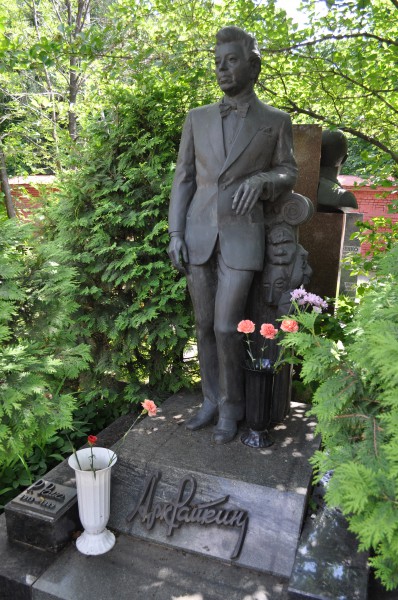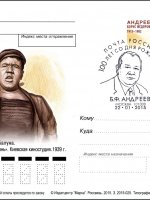Arkadi Raïkine is a Actor born on 24 october 1911 at Riga (Lettonie)

Arkady Isaakovich Raikin (Russian: Аркадий Исаакович Райкин; October 24 [O.S. October 10] 1911 – December 17, 1987) was a Soviet stand-up comedian, theater and film actor, and stage director. He led the school of Soviet and Russian humorists for about half a century.
Raikin was the creator of a whole array of unforgettable satirical characters, and a living legend of his time and his country. Some of the brilliant satirical and lyrical images created by Raikin acquired their second life in the serial TV film People and Mannequins.
Raikin is often compared with Charlie Chaplin. His fame in the Soviet Union, and throughout Central and Eastern Europe, was such that he was invited to participate in the opening night of BBC Two television in 1964, although the broadcast had to be postponed for one day due to a power failure. His trip to London for the BBC broadcast—during which he was reunited with his British cousin, distinguished pianist Bruno Raikin—marked the first of only two times when the Soviet government permitted him to perform in the West. Arkady Raikin also maintained good working relationships with Marcel Marceau and some other foreign actors.
Three years before his death, Raikin finally moved to Moscow, where he opened the Satyricon Theatre, now run by his son Konstantin Raikin, also an acclaimed actor. His wife, Roma, played a major role in guiding his career, and his daughter, Ekaterina, also had a successful career as a Moscow actress. For a month during the summer of 1987, Raikin hosted his American cousin, Washington D.C. attorney Steven Raikin, as a guest in his Moscow flat. In September 1987 the Soviet Ministry of Culture finally permitted Raikin to visit the United States, where, with his son and daughter, he gave emotional farewell performances in several cities to adoring audiences of Russian émigrés.
Source : Wikidata
Arkadi Raïkine

Birth 24 october 1911 at Riga (Lettonie)
Death 17 december 1987 (at 76 years) at Moscow (Russie)
Awards People's Artist of the USSR, Order of Lenin, Medal "For the Victory over Germany in the Great Patriotic War 1941–1945"
Death 17 december 1987 (at 76 years) at Moscow (Russie)
Awards People's Artist of the USSR, Order of Lenin, Medal "For the Victory over Germany in the Great Patriotic War 1941–1945"
Biography
Raikin was born into a Jewish family in Riga, in the Governorate of Livonia of the Russian Empire (present-day Latvia). He graduated from the Leningrad Theatrical Technicum in 1935 and worked in both state theatres and variety shows. In 1939, he founded his own theatre in Leningrad, where he used skits and impersonations to ridicule the inefficiency of Communist bureaucracy and the Soviet way of life. In the Stalinist police state this was prone to danger, as it was not uncommon to get purged not only for telling a casual joke, but even for not reporting it to the authorities. He also appeared in several comedies during and after the Great Patriotic War.Raikin was the creator of a whole array of unforgettable satirical characters, and a living legend of his time and his country. Some of the brilliant satirical and lyrical images created by Raikin acquired their second life in the serial TV film People and Mannequins.
Raikin is often compared with Charlie Chaplin. His fame in the Soviet Union, and throughout Central and Eastern Europe, was such that he was invited to participate in the opening night of BBC Two television in 1964, although the broadcast had to be postponed for one day due to a power failure. His trip to London for the BBC broadcast—during which he was reunited with his British cousin, distinguished pianist Bruno Raikin—marked the first of only two times when the Soviet government permitted him to perform in the West. Arkady Raikin also maintained good working relationships with Marcel Marceau and some other foreign actors.
Three years before his death, Raikin finally moved to Moscow, where he opened the Satyricon Theatre, now run by his son Konstantin Raikin, also an acclaimed actor. His wife, Roma, played a major role in guiding his career, and his daughter, Ekaterina, also had a successful career as a Moscow actress. For a month during the summer of 1987, Raikin hosted his American cousin, Washington D.C. attorney Steven Raikin, as a guest in his Moscow flat. In September 1987 the Soviet Ministry of Culture finally permitted Raikin to visit the United States, where, with his son and daughter, he gave emotional farewell performances in several cities to adoring audiences of Russian émigrés.
Usually with
Filmography of Arkadi Raïkine (2 films)
Actor

Wings of Victory (1941)
, 1h37Directed by Mikhaïl Kalatozov
Genres Drama, War, Biography
Themes Transport films, Aviation films
Actors Mikheil Gelovani, Mark Bernes, Mikhaïl Kalatozov, Boris Andreyev, Arkadi Raïkine
Roles American journalist
Rating64%





Valeri Tchkalov, l'un des meilleurs pilotes de voltige aérienne, s'ennuie dans les chartes et les instructions, il cherche à faire des virages vertigineux, des vols ultra-bas, etc. Un jour, il effectue le vol sous le pont de la Neva à Leningrad et se voit expulsé de son unité.

Tractor Drivers (1939)
, 1h28Directed by Ivan Pyriev
Genres Drama, Comedy, Musical, Romance
Themes Films about music and musicians, Politique, Films about the labor movement, Musical films, Political films
Actors Marina Ladynina, Nikolai Kryuchkov, Boris Andreyev, Stepan Kayukov, Arkadi Raïkine
Roles un kolkhozien, épisode
Rating63%





Klim Yarko rentre en Ukraine par le train après son service militaire effectué dans une unité blindée. Il avoue aux camarades qui voyagent avec lui ne pas savoir où s'installer, car sans famille il n'est attendu par personne. Il a toutefois une idée. Dans une gazette, il est tombé sur la photo de Mariana Bajan qui dirige une brigade de tractoristes dans un kolkhoze. Il se rend donc à ce kolkhoze à la tombée de la nuit. En chemin, il découvre Mariana qui vient de faire une chute de moto. Il lui porte secours et rentre avec elle au village. Les jeunes gens sympathisent. Klim en tant que bon mécanicien est très bien accueilli par le directeur du kolkhoze Kirill Petrovitch. Toutefois il ne sait pas que, pour repousser les prétendants à son cœur, Mariana avait demandé à l'un des kolkhoziens, un certain Nazar Douma, de se présenter comme son fiancé. Celui-ci prend son rôle très au sérieux et, un matin, essaye de chasser Klim comme les autres. Klim décide de partir, mais à la suite d'un concours de circonstances il devient brigadier de l'unité concurrente de Mariana et chef de Nazar. Nazar n'est pas bien noté par Kirill Petrovitch qui demande à Klim d'améliorer la discipline et le rendement de sa brigade, pour que le fiancé de Mariana devienne un kolkhozien modèle digne de la main de leur meilleure travailleuse. Klim réussit cette mission, mais alors que Kirill Petrovitch évoque dans son bureau la préparation du mariage, il envoie valser les meubles et se met à hurler que ni Nazar ni aucun autre ne se mettra entre lui et sa bien-aimée. Kirill Petrovitch n'en paraît nullement perturbé, il est prêt à donner sa bénédiction à tous les amoureux pourvu qu'ils soient de parfaits tractoristes. Le film se termine par la scène du grand mariage où tout le monde chante des chansons patriotiques et lève son verre vers le portrait du camarade Staline.
 Connection
Connection



